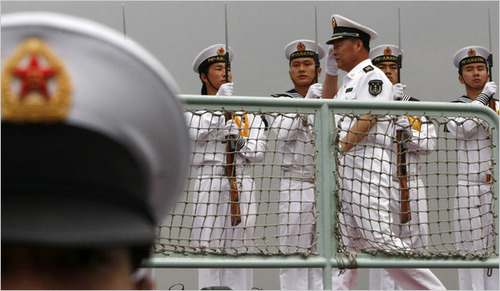
INTERNATIONAL: "Chinese Military Seeks to Extend Its Naval Power," by Edward Wong, New York Times, 24 April 2010.
The cat is out of the bag:
The Chinese military is seeking to project naval power well beyond the Chinese coast, from the oil ports of the Middle East to the shipping lanes of the Pacific, where the United States Navy has long reigned as the dominant force, military officials and analysts say.
China calls the new strategy "far sea defense," and the speed with which it is building long-range capabilities has surprised foreign military officials.
The strategy is a sharp break from the traditional, narrower doctrine of preparing for war over the self-governing island of Taiwan or defending the Chinese coast. Now, Chinese admirals say they want warships to escort commercial vessels that are crucial to the country's economy, from as far as the Persian Gulf to the Strait of Malacca, in Southeast Asia, and to help secure Chinese interests in the resource-rich South and East China Seas.
In late March, two Chinese warships docked in Abu Dhabi, the first time the modern Chinese Navy made a port visit in the Middle East.
The overall plan reflects China's growing sense of self-confidence and increasing willingness to assert its interests abroad. China's naval ambitions are being felt, too, in recent muscle flexing with the United States: in March, Chinese officials told senior American officials privately that China would brook no foreign interference in its territorial issues in the South China Sea, said a senior American official involved in China policy.
The naval expansion will not make China a serious rival to American naval hegemony in the near future, and there are few indications that China has aggressive intentions toward the United States or other countries.
But China, now the world's leading exporter and a giant buyer of oil and other natural resources, is also no longer content to trust the security of sea lanes to the Americans, and its definition of its own core interests has expanded along with its economic clout.
My tact over the years has been dual: 1) belittling China's military ambitions beyond Taiwan and its regional waters (where all the rockets and new subs are focused); and 2) preaching--going all the way back to PNM--that China's military (i.e., its navy) is logically coming to the Middle East for all the same reasons why we once came.
As I say, the cat's pretty much out of the bag now on the second one. And it's little surprise. Actually, on the basis of the real numbers, the shift is long overdue: the Middle East is hugely important to Asia, which takes out over half of its exports, whereas the PG ranks behind Africa, Latin America, Mexico & Canada (i.e., non-US NorthAm) and the U.S. itself as the fifth most important source of our oil. If not for our century-plus grand strategic instinct for the "open door," the real question would be, Why is the US Navy there to that degree?
So like I said for years in the brief, "The question isn't whether the Chinese are coming. The question is how we greet them."
As for China's growing assertiveness in its home seas, that much is both expected and typically petty of the Chinese (back to my point #1). Should we drawn into it?
We will because the locals will fear it, and that's the best way to be drawn in.
I mean, when Lee Kuan Yew starts worrying publicly . . .
Last fall, during a speech in Washington, Lee Kuan Yew, the former Singaporean leader, reflected widespread anxieties when he noted China's naval rise and urged the United States to maintain its regional presence. "U.S. core interest requires that it remains the superior power on the Pacific," he said. "To give up this position would diminish America's role throughout the world."
. . . you know the local backlash has begun. This is fine and predictable. We want to meet the expectations of allies without picking any stupid fights, even though the occasional sort-of-stupid fight can be useful in triggering dialogue. Actually, our Navy is fairly sophisticated on that score.
Here's hoping we pick our moments well.
 Friday, May 7, 2010 at 12:05AM
Friday, May 7, 2010 at 12:05AM 






























